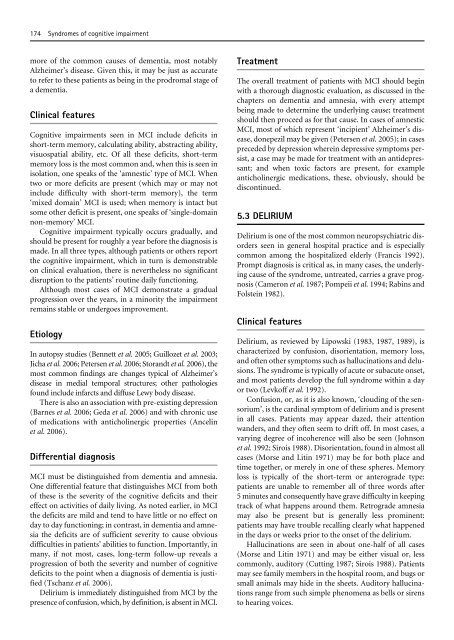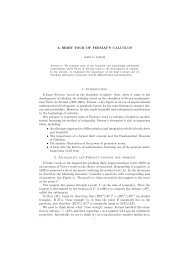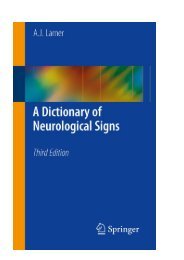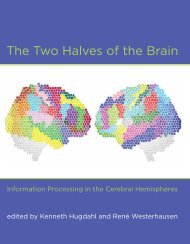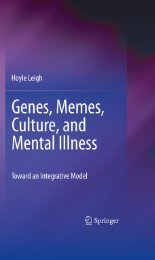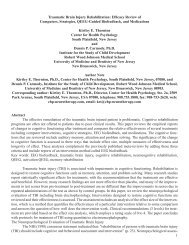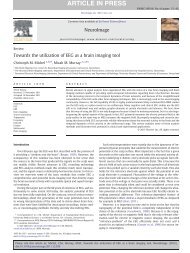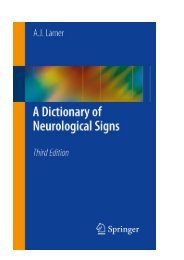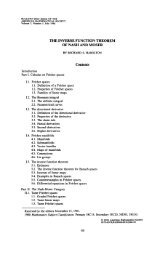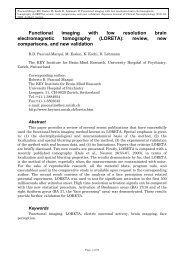- Page 2 and 3:
xd 3/10/08 5:51 PM Page i Textbook
- Page 4 and 5:
ims.qxd 3/10/08 5:51 PM Page iii Te
- Page 6 and 7:
ims.qxd 3/10/08 5:51 PM Page v Dedi
- Page 8 and 9:
Contents Preface xiii PART I DIAGNO
- Page 10 and 11:
ims.qxd 3/10/08 5:51 PM Page ix Con
- Page 12 and 13:
ims.qxd 3/10/08 5:51 PM Page xi Con
- Page 14 and 15:
ims.qxd 3/10/08 5:51 PM Page xiii P
- Page 16 and 17:
01.qxd 3/10/08 9:33 AM Page 1 DIAGN
- Page 18 and 19:
01.qxd 3/10/08 9:33 AM Page 3 Diagn
- Page 20 and 21:
01.qxd 3/10/08 9:33 AM Page 5 Concl
- Page 22 and 23:
01.qxd 3/10/08 9:33 AM Page 7 as af
- Page 24 and 25:
01.qxd 3/10/08 9:33 AM Page 9 they
- Page 26 and 27:
01.qxd 3/10/08 9:33 AM Page 11 as,
- Page 28 and 29:
01.qxd 3/10/08 9:33 AM Page 13 of t
- Page 30 and 31:
01.qxd 3/10/08 9:33 AM Page 15 pati
- Page 32 and 33:
01.qxd 3/10/08 9:33 AM Page 17 to m
- Page 34 and 35:
01.qxd 3/10/08 9:33 AM Page 19 vaso
- Page 36 and 37:
01.qxd 3/10/08 9:33 AM Page 21 Figu
- Page 38 and 39:
01.qxd 3/10/08 9:33 AM Page 23 Norm
- Page 40 and 41:
01.qxd 3/10/08 9:33 AM Page 25 Hunt
- Page 42 and 43:
01.qxd 3/10/08 9:33 AM Page 27 illu
- Page 44 and 45:
01.qxd 3/10/08 9:33 AM Page 29 rare
- Page 46 and 47:
01.qxd 3/10/08 9:33 AM Page 31 Elec
- Page 48 and 49:
01.qxd 3/10/08 9:33 AM Page 33 char
- Page 50 and 51:
01.qxd 3/10/08 9:33 AM Page 35 Bayk
- Page 52 and 53:
01.qxd 3/10/08 9:33 AM Page 37 van
- Page 54 and 55:
01.qxd 3/10/08 9:33 AM Page 39 Linn
- Page 56 and 57:
01.qxd 3/10/08 9:33 AM Page 41 Ster
- Page 58 and 59:
02.qxd 3/10/08 9:32 AM Page 43 SIGN
- Page 60 and 61:
‘Cortical’ signs and symptoms 2
- Page 62 and 63:
02.qxd 3/10/08 9:32 AM Page 47 Sens
- Page 64 and 65:
02.qxd 3/10/08 9:32 AM Page 49 deba
- Page 66 and 67:
02.qxd 3/10/08 9:32 AM Page 51 Apra
- Page 68 and 69:
02.qxd 3/10/08 9:32 AM Page 53 them
- Page 70 and 71:
02.qxd 3/10/08 9:32 AM Page 55 Vari
- Page 72 and 73:
02.qxd 3/10/08 9:32 AM Page 57 Negl
- Page 74 and 75:
02.qxd 3/10/08 9:32 AM Page 59 Sect
- Page 76 and 77:
02.qxd 3/10/08 9:32 AM Page 61 Anos
- Page 78 and 79:
02.qxd 3/10/08 9:32 AM Page 63 VISU
- Page 80 and 81:
02.qxd 3/10/08 9:32 AM Page 65 Assa
- Page 82 and 83:
02.qxd 3/10/08 9:32 AM Page 67 Gers
- Page 84 and 85:
02.qxd 3/10/08 9:32 AM Page 69 Mead
- Page 86 and 87:
02.qxd 3/10/08 9:32 AM Page 71 Togh
- Page 88 and 89:
03.qxd 3/10/08 9:32 AM Page 73 arm
- Page 90 and 91:
03.qxd 3/10/08 9:32 AM Page 75 Trea
- Page 92 and 93:
03.qxd 3/10/08 9:32 AM Page 77 Diff
- Page 94 and 95:
03.qxd 3/10/08 9:32 AM Page 79 jerk
- Page 96 and 97:
03.qxd 3/10/08 9:32 AM Page 81 deli
- Page 98 and 99:
03.qxd 3/10/08 9:32 AM Page 83 in t
- Page 100 and 101:
03.qxd 3/10/08 9:32 AM Page 85 prim
- Page 102 and 103:
03.qxd 3/10/08 9:32 AM Page 87 betw
- Page 104 and 105:
03.qxd 3/10/08 9:32 AM Page 89 mult
- Page 106 and 107:
03.qxd 3/10/08 9:32 AM Page 91 evol
- Page 108 and 109:
03.qxd 3/10/08 9:32 AM Page 93 meto
- Page 110 and 111:
03.qxd 3/10/08 9:32 AM Page 95 Tabl
- Page 112 and 113:
03.qxd 3/10/08 9:32 AM Page 97 typi
- Page 114 and 115:
03.qxd 3/10/08 9:32 AM Page 99 pres
- Page 116 and 117:
03.qxd 3/10/08 9:32 AM Page 101 Bro
- Page 118 and 119:
03.qxd 3/10/08 9:32 AM Page 103 Des
- Page 120 and 121:
03.qxd 3/10/08 9:32 AM Page 105 Gwi
- Page 122 and 123:
03.qxd 3/10/08 9:32 AM Page 107 Kla
- Page 124 and 125:
03.qxd 3/10/08 9:32 AM Page 109 Mah
- Page 126 and 127:
03.qxd 3/10/08 9:32 AM Page 111 Pen
- Page 128 and 129:
03.qxd 3/10/08 9:32 AM Page 113 Set
- Page 130 and 131:
03.qxd 3/10/08 9:32 AM Page 115 Van
- Page 132 and 133:
04.qxd 3/10/08 9:33 AM Page 117 Oth
- Page 134 and 135:
04.qxd 3/10/08 9:33 AM Page 119 lim
- Page 136 and 137:
04.qxd 3/10/08 9:33 AM Page 121 ask
- Page 138 and 139: 04.qxd 3/10/08 9:33 AM Page 123 Tre
- Page 140 and 141: 04.qxd 3/10/08 9:33 AM Page 125 poi
- Page 142 and 143: 04.qxd 3/10/08 9:33 AM Page 127 Dif
- Page 144 and 145: 04.qxd 3/10/08 9:33 AM Page 129 ser
- Page 146 and 147: 04.qxd 3/10/08 9:33 AM Page 131 ali
- Page 148 and 149: 04.qxd 3/10/08 9:33 AM Page 133 Cli
- Page 150 and 151: 04.qxd 3/10/08 9:33 AM Page 135 glo
- Page 152 and 153: 04.qxd 3/10/08 9:33 AM Page 137 les
- Page 154 and 155: 04.qxd 3/10/08 9:33 AM Page 139 198
- Page 156 and 157: 04.qxd 3/10/08 9:33 AM Page 141 Cli
- Page 158 and 159: 04.qxd 3/10/08 9:33 AM Page 143 sou
- Page 160 and 161: 04.qxd 3/10/08 9:33 AM Page 145 dif
- Page 162 and 163: 04.qxd 3/10/08 9:33 AM Page 147 wen
- Page 164 and 165: 04.qxd 3/10/08 9:33 AM Page 149 Ass
- Page 166 and 167: 04.qxd 3/10/08 9:33 AM Page 151 Cha
- Page 168 and 169: 04.qxd 3/10/08 9:33 AM Page 153 Goe
- Page 170 and 171: 04.qxd 3/10/08 9:33 AM Page 155 Kat
- Page 172 and 173: 04.qxd 3/10/08 9:33 AM Page 157 Men
- Page 174 and 175: 04.qxd 3/10/08 9:33 AM Page 159 Rus
- Page 176 and 177: 04.qxd 3/10/08 9:33 AM Page 161 Uka
- Page 178 and 179: 05.qxd 3/10/08 9:34 AM Page 163 acc
- Page 180 and 181: 05.qxd 3/10/08 9:34 AM Page 165 Tab
- Page 182 and 183: 05.qxd 3/10/08 9:34 AM Page 167 Lac
- Page 184 and 185: 05.qxd 3/10/08 9:34 AM Page 169 WIT
- Page 186 and 187: 05.qxd 3/10/08 9:34 AM Page 171 Sne
- Page 190 and 191: 05.qxd 3/10/08 9:34 AM Page 175 Del
- Page 192 and 193: 05.qxd 3/10/08 9:34 AM Page 177 Tab
- Page 194 and 195: 05.qxd 3/10/08 9:34 AM Page 179 Res
- Page 196 and 197: 05.qxd 3/10/08 9:34 AM Page 181 see
- Page 198 and 199: 05.qxd 3/10/08 9:34 AM Page 183 sid
- Page 200 and 201: 05.qxd 3/10/08 9:34 AM Page 185 amn
- Page 202 and 203: 05.qxd 3/10/08 9:34 AM Page 187 in
- Page 204 and 205: 05.qxd 3/10/08 9:34 AM Page 189 (Br
- Page 206 and 207: 05.qxd 3/10/08 9:34 AM Page 191 Bal
- Page 208 and 209: 05.qxd 3/10/08 9:34 AM Page 193 var
- Page 210 and 211: 05.qxd 3/10/08 9:34 AM Page 195 Fri
- Page 212 and 213: 05.qxd 3/10/08 9:34 AM Page 197 Hos
- Page 214 and 215: 05.qxd 3/10/08 9:34 AM Page 199 Lay
- Page 216 and 217: 05.qxd 3/10/08 9:34 AM Page 201 Mil
- Page 218 and 219: 05.qxd 3/10/08 9:34 AM Page 203 Pri
- Page 220 and 221: 05.qxd 3/10/08 9:34 AM Page 205 Ste
- Page 222 and 223: 05.qxd 3/10/08 9:34 AM Page 207 Wis
- Page 224 and 225: 06.qxd 3/10/08 9:34 AM Page 209 Tab
- Page 226 and 227: 06.qxd 3/10/08 9:34 AM Page 211 an
- Page 228 and 229: 06.qxd 3/10/08 9:34 AM Page 213 Whi
- Page 230 and 231: 06.qxd 3/10/08 9:34 AM Page 215 pat
- Page 232 and 233: 06.qxd 3/10/08 9:34 AM Page 217 Hyp
- Page 234 and 235: 06.qxd 3/10/08 9:34 AM Page 219 epi
- Page 236 and 237: 06.qxd 3/10/08 9:34 AM Page 221 one
- Page 238 and 239:
06.qxd 3/10/08 9:34 AM Page 223 als
- Page 240 and 241:
06.qxd 3/10/08 9:34 AM Page 225 lor
- Page 242 and 243:
06.qxd 3/10/08 9:34 AM Page 227 att
- Page 244 and 245:
06.qxd 3/10/08 9:34 AM Page 229 Bro
- Page 246 and 247:
06.qxd 3/10/08 9:34 AM Page 231 Hal
- Page 248 and 249:
06.qxd 3/10/08 9:34 AM Page 233 Meh
- Page 250 and 251:
06.qxd 3/10/08 9:34 AM Page 235 Sch
- Page 252 and 253:
06.qxd 3/10/08 9:34 AM Page 237 Wro
- Page 254 and 255:
07.qxd 3/10/08 9:35 AM Page 239 Tab
- Page 256 and 257:
07.qxd 3/10/08 9:35 AM Page 241 wit
- Page 258 and 259:
07.qxd 3/10/08 9:35 AM Page 243 der
- Page 260 and 261:
07.qxd 3/10/08 9:35 AM Page 245 fel
- Page 262 and 263:
07.qxd 3/10/08 9:35 AM Page 247 be
- Page 264 and 265:
07.qxd 3/10/08 9:35 AM Page 249 hei
- Page 266 and 267:
07.qxd 3/10/08 9:35 AM Page 251 bes
- Page 268 and 269:
07.qxd 3/10/08 9:35 AM Page 253 sev
- Page 270 and 271:
07.qxd 3/10/08 9:35 AM Page 255 con
- Page 272 and 273:
07.qxd 3/10/08 9:35 AM Page 257 a b
- Page 274 and 275:
07.qxd 3/10/08 9:35 AM Page 259 197
- Page 276 and 277:
07.qxd 3/10/08 9:35 AM Page 261 Tab
- Page 278 and 279:
07.qxd 3/10/08 9:35 AM Page 263 2 p
- Page 280 and 281:
07.qxd 3/10/08 9:35 AM Page 265 ham
- Page 282 and 283:
07.qxd 3/10/08 9:35 AM Page 267 Stu
- Page 284 and 285:
07.qxd 3/10/08 9:35 AM Page 269 up
- Page 286 and 287:
07.qxd 3/10/08 9:35 AM Page 271 the
- Page 288 and 289:
07.qxd 3/10/08 9:35 AM Page 273 juv
- Page 290 and 291:
07.qxd 3/10/08 9:35 AM Page 275 inc
- Page 292 and 293:
07.qxd 3/10/08 9:35 AM Page 277 pos
- Page 294 and 295:
07.qxd 3/10/08 9:35 AM Page 279 sym
- Page 296 and 297:
07.qxd 3/10/08 9:35 AM Page 281 ble
- Page 298 and 299:
07.qxd 3/10/08 9:35 AM Page 283 fin
- Page 300 and 301:
07.qxd 3/10/08 9:35 AM Page 285 OTH
- Page 302 and 303:
07.qxd 3/10/08 9:35 AM Page 287 hyp
- Page 304 and 305:
07.qxd 3/10/08 9:35 AM Page 289 int
- Page 306 and 307:
07.qxd 3/10/08 9:35 AM Page 291 of
- Page 308 and 309:
07.qxd 3/10/08 9:35 AM Page 293 of
- Page 310 and 311:
07.qxd 3/10/08 9:35 AM Page 295 and
- Page 312 and 313:
07.qxd 3/10/08 9:35 AM Page 297 ref
- Page 314 and 315:
07.qxd 3/10/08 9:35 AM Page 299 Con
- Page 316 and 317:
07.qxd 3/10/08 9:35 AM Page 301 not
- Page 318 and 319:
07.qxd 3/10/08 9:35 AM Page 303 cas
- Page 320 and 321:
07.qxd 3/10/08 9:35 AM Page 305 hip
- Page 322 and 323:
07.qxd 3/10/08 9:35 AM Page 307 and
- Page 324 and 325:
07.qxd 3/10/08 9:35 AM Page 309 Cho
- Page 326 and 327:
07.qxd 3/10/08 9:35 AM Page 311 Fah
- Page 328 and 329:
07.qxd 3/10/08 9:35 AM Page 313 Glo
- Page 330 and 331:
07.qxd 3/10/08 9:35 AM Page 315 Hjo
- Page 332 and 333:
07.qxd 3/10/08 9:35 AM Page 317 Kir
- Page 334 and 335:
07.qxd 3/10/08 9:35 AM Page 319 Lip
- Page 336 and 337:
07.qxd 3/10/08 9:35 AM Page 321 Mey
- Page 338 and 339:
07.qxd 3/10/08 9:35 AM Page 323 Oxb
- Page 340 and 341:
07.qxd 3/10/08 9:35 AM Page 325 Rem
- Page 342 and 343:
07.qxd 3/10/08 9:35 AM Page 327 Ser
- Page 344 and 345:
07.qxd 3/10/08 9:35 AM Page 329 Tat
- Page 346 and 347:
07.qxd 3/10/08 9:35 AM Page 331 Wil
- Page 348 and 349:
08.qxd 3/10/08 9:38 AM Page 333 SPE
- Page 350 and 351:
08.qxd 3/15/08 4:37 PM Page 335 Neu
- Page 352 and 353:
08.qxd 3/10/08 9:38 AM Page 337 Fig
- Page 354 and 355:
08.qxd 3/10/08 9:38 AM Page 339 Dif
- Page 356 and 357:
08.qxd 3/10/08 9:38 AM Page 341 Fig
- Page 358 and 359:
08.qxd 3/10/08 9:38 AM Page 343 nes
- Page 360 and 361:
08.qxd 3/10/08 9:38 AM Page 345 foo
- Page 362 and 363:
08.qxd 3/10/08 9:38 AM Page 347 Tab
- Page 364 and 365:
08.qxd 3/10/08 9:38 AM Page 349 mil
- Page 366 and 367:
08.qxd 3/10/08 9:38 AM Page 351 Dif
- Page 368 and 369:
08.qxd 3/10/08 9:38 AM Page 353 Fig
- Page 370 and 371:
08.qxd 3/10/08 9:38 AM Page 355 The
- Page 372 and 373:
08.qxd 3/10/08 9:38 AM Page 357 lif
- Page 374 and 375:
08.qxd 3/10/08 9:38 AM Page 359 and
- Page 376 and 377:
08.qxd 3/10/08 9:38 AM Page 361 Cou
- Page 378 and 379:
08.qxd 3/10/08 9:38 AM Page 363 Som
- Page 380 and 381:
08.qxd 3/10/08 9:38 AM Page 365 3.7
- Page 382 and 383:
08.qxd 3/10/08 9:38 AM Page 367 In
- Page 384 and 385:
08.qxd 3/10/08 9:38 AM Page 369 whi
- Page 386 and 387:
08.qxd 3/10/08 9:38 AM Page 371 anx
- Page 388 and 389:
08.qxd 3/10/08 9:38 AM Page 373 Ano
- Page 390 and 391:
08.qxd 3/10/08 9:38 AM Page 375 slo
- Page 392 and 393:
08.qxd 3/10/08 9:38 AM Page 377 see
- Page 394 and 395:
08.qxd 3/10/08 9:38 AM Page 379 The
- Page 396 and 397:
08.qxd 3/10/08 9:38 AM Page 381 fin
- Page 398 and 399:
08.qxd 3/10/08 9:38 AM Page 383 Byr
- Page 400 and 401:
08.qxd 3/10/08 9:38 AM Page 385 12-
- Page 402 and 403:
08.qxd 3/10/08 9:38 AM Page 387 Gre
- Page 404 and 405:
08.qxd 3/10/08 9:38 AM Page 389 Int
- Page 406 and 407:
08.qxd 3/10/08 9:38 AM Page 391 Lec
- Page 408 and 409:
08.qxd 3/10/08 9:38 AM Page 393 McK
- Page 410 and 411:
08.qxd 3/10/08 9:38 AM Page 395 Ono
- Page 412 and 413:
08.qxd 3/10/08 9:38 AM Page 397 Rin
- Page 414 and 415:
08.qxd 3/10/08 9:38 AM Page 399 Sin
- Page 416 and 417:
08.qxd 3/10/08 9:38 AM Page 401 flu
- Page 418 and 419:
09.qxd 3/10/08 9:39 AM Page 403 Con
- Page 420 and 421:
09.qxd 3/10/08 9:39 AM Page 405 wer
- Page 422 and 423:
09.qxd 3/10/08 9:39 AM Page 407 Tre
- Page 424 and 425:
09.qxd 3/10/08 9:39 AM Page 409 Oth
- Page 426 and 427:
09.qxd 3/10/08 9:39 AM Page 411 The
- Page 428 and 429:
09.qxd 3/10/08 9:39 AM Page 413 (Cl
- Page 430 and 431:
09.qxd 3/10/08 9:39 AM Page 415 fea
- Page 432 and 433:
09.qxd 3/10/08 9:39 AM Page 417 wit
- Page 434 and 435:
09.qxd 3/10/08 9:39 AM Page 419 tel
- Page 436 and 437:
09.qxd 3/10/08 9:39 AM Page 421 The
- Page 438 and 439:
09.qxd 3/10/08 9:39 AM Page 423 9.1
- Page 440 and 441:
09.qxd 3/10/08 9:39 AM Page 425 Boe
- Page 442 and 443:
09.qxd 3/10/08 9:39 AM Page 427 Gui
- Page 444 and 445:
09.qxd 3/10/08 9:39 AM Page 429 McV
- Page 446 and 447:
09.qxd 3/10/08 9:39 AM Page 431 ado
- Page 448 and 449:
10.qxd 3/10/08 5:52 PM Page 433 Vas
- Page 450 and 451:
10.qxd 3/10/08 5:52 PM Page 435 or
- Page 452 and 453:
10.qxd 3/10/08 5:52 PM Page 437 cha
- Page 454 and 455:
10.qxd 3/10/08 5:52 PM Page 439 Mag
- Page 456 and 457:
10.qxd 3/10/08 5:52 PM Page 441 The
- Page 458 and 459:
10.qxd 3/10/08 5:52 PM Page 443 Cli
- Page 460 and 461:
10.qxd 3/10/08 5:52 PM Page 445 met
- Page 462 and 463:
10.qxd 3/10/08 5:52 PM Page 447 10.
- Page 464 and 465:
10.qxd 3/10/08 5:52 PM Page 449 Bla
- Page 466 and 467:
10.qxd 3/10/08 5:52 PM Page 451 Hod
- Page 468 and 469:
10.qxd 3/10/08 5:52 PM Page 453 San
- Page 470 and 471:
11.qxd 3/10/08 9:49 AM Page 455 Fig
- Page 472 and 473:
11.qxd 3/10/08 9:49 AM Page 457 Fig
- Page 474 and 475:
11.qxd 3/10/08 9:49 AM Page 459 cha
- Page 476 and 477:
11.qxd 3/10/08 9:49 AM Page 461 Sch
- Page 478 and 479:
12.qxd 3/10/08 9:50 AM Page 463 sug
- Page 480 and 481:
12.qxd 3/10/08 9:50 AM Page 465 Gri
- Page 482 and 483:
13.qxd 3/10/08 9:50 AM Page 467 hom
- Page 484 and 485:
13.qxd 3/10/08 9:50 AM Page 469 del
- Page 486 and 487:
13.qxd 3/10/08 9:50 AM Page 471 pre
- Page 488 and 489:
13.qxd 3/10/08 9:50 AM Page 473 Dif
- Page 490 and 491:
13.qxd 3/10/08 9:50 AM Page 475 (Be
- Page 492 and 493:
13.qxd 3/10/08 9:50 AM Page 477 tha
- Page 494 and 495:
13.qxd 3/10/08 9:50 AM Page 479 by
- Page 496 and 497:
13.qxd 3/10/08 9:50 AM Page 481 no
- Page 498 and 499:
13.qxd 3/10/08 9:50 AM Page 483 hea
- Page 500 and 501:
13.qxd 3/10/08 9:50 AM Page 485 str
- Page 502 and 503:
13.qxd 3/10/08 9:50 AM Page 487 Cad
- Page 504 and 505:
13.qxd 3/10/08 9:50 AM Page 489 Kal
- Page 506 and 507:
13.qxd 3/10/08 9:50 AM Page 491 Rop
- Page 508 and 509:
Infectious and related disorders 14
- Page 510 and 511:
14.qxd 3/10/08 9:50 AM Page 495 sei
- Page 512 and 513:
14.qxd 3/10/08 9:50 AM Page 497 deg
- Page 514 and 515:
14.qxd 3/10/08 9:50 AM Page 499 et
- Page 516 and 517:
14.qxd 3/10/08 9:50 AM Page 501 In
- Page 518 and 519:
14.qxd 3/10/08 9:50 AM Page 503 sym
- Page 520 and 521:
14.qxd 3/10/08 9:50 AM Page 505 Fig
- Page 522 and 523:
14.qxd 3/10/08 9:50 AM Page 507 Cli
- Page 524 and 525:
14.qxd 3/10/08 9:50 AM Page 509 ind
- Page 526 and 527:
14.qxd 3/10/08 9:50 AM Page 511 ner
- Page 528 and 529:
14.qxd 3/10/08 9:50 AM Page 513 199
- Page 530 and 531:
14.qxd 3/10/08 9:50 AM Page 515 ery
- Page 532 and 533:
14.qxd 3/10/08 9:50 AM Page 517 Adi
- Page 534 and 535:
14.qxd 3/10/08 9:50 AM Page 519 Gua
- Page 536 and 537:
14.qxd 3/10/08 9:50 AM Page 521 Lin
- Page 538 and 539:
14.qxd 3/10/08 9:50 AM Page 523 Rou
- Page 540 and 541:
15.qxd 3/10/08 9:51 AM Page 525 Pri
- Page 542 and 543:
15.qxd 3/10/08 9:51 AM Page 527 how
- Page 544 and 545:
15.qxd 3/10/08 9:51 AM Page 529 dec
- Page 546 and 547:
15.qxd 3/10/08 9:51 AM Page 531 Gib
- Page 548 and 549:
15.qxd 3/10/08 9:51 AM Page 533 Zei
- Page 550 and 551:
16.qxd 3/10/08 9:52 AM Page 535 myo
- Page 552 and 553:
16.qxd 3/10/08 9:52 AM Page 537 In
- Page 554 and 555:
16.qxd 3/10/08 9:52 AM Page 539 occ
- Page 556 and 557:
16.qxd 3/10/08 9:52 AM Page 541 wit
- Page 558 and 559:
16.qxd 3/10/08 9:52 AM Page 543 Var
- Page 560 and 561:
17.qxd 3/10/08 9:52 AM Page 545 of
- Page 562 and 563:
17.qxd 3/10/08 9:52 AM Page 547 fir
- Page 564 and 565:
17.qxd 3/10/08 9:52 AM Page 549 cyt
- Page 566 and 567:
17.qxd 3/10/08 9:52 AM Page 551 tap
- Page 568 and 569:
17.qxd 3/10/08 9:52 AM Page 553 Eti
- Page 570 and 571:
17.qxd 3/10/08 9:52 AM Page 555 sei
- Page 572 and 573:
17.qxd 3/10/08 9:52 AM Page 557 and
- Page 574 and 575:
17.qxd 3/10/08 9:52 AM Page 559 Tic
- Page 576 and 577:
17.qxd 3/10/08 9:52 AM Page 561 ess
- Page 578 and 579:
17.qxd 3/10/08 9:52 AM Page 563 Del
- Page 580 and 581:
17.qxd 3/10/08 9:52 AM Page 565 Kea
- Page 582 and 583:
17.qxd 3/10/08 9:52 AM Page 567 rad
- Page 584 and 585:
18.qxd 3/10/08 9:52 AM Page 569 SLE
- Page 586 and 587:
18.qxd 3/10/08 9:52 AM Page 571 try
- Page 588 and 589:
18.qxd 3/10/08 9:52 AM Page 573 nig
- Page 590 and 591:
18.qxd 3/10/08 9:52 AM Page 575 is
- Page 592 and 593:
18.qxd 3/10/08 9:52 AM Page 577 Mod
- Page 594 and 595:
18.qxd 3/10/08 9:52 AM Page 579 how
- Page 596 and 597:
18.qxd 3/10/08 9:52 AM Page 581 esp
- Page 598 and 599:
18.qxd 3/10/08 9:52 AM Page 583 Cou
- Page 600 and 601:
18.qxd 3/10/08 9:52 AM Page 585 thi
- Page 602 and 603:
18.qxd 3/10/08 9:52 AM Page 587 18.
- Page 604 and 605:
18.qxd 3/10/08 9:52 AM Page 589 Dau
- Page 606 and 607:
18.qxd 3/10/08 9:52 AM Page 591 mel
- Page 608 and 609:
18.qxd 3/10/08 9:52 AM Page 593 Rei
- Page 610 and 611:
18.qxd 3/10/08 9:52 AM Page 595 Win
- Page 612 and 613:
19.qxd 3/10/08 9:53 AM Page 597 Pap
- Page 614 and 615:
19.qxd 3/10/08 9:53 AM Page 599 In
- Page 616 and 617:
19.qxd 3/10/08 9:53 AM Page 601 CSF
- Page 618 and 619:
19.qxd 3/10/08 9:53 AM Page 603 act
- Page 620 and 621:
19.qxd 3/10/08 9:53 AM Page 605 Lis
- Page 622 and 623:
20.qxd 3/10/08 9:58 AM Page 607 Aud
- Page 624 and 625:
20.qxd 3/10/08 9:58 AM Page 609 of
- Page 626 and 627:
20.qxd 3/10/08 9:58 AM Page 611 In
- Page 628 and 629:
20.qxd 3/10/08 9:58 AM Page 613 and
- Page 630 and 631:
20.qxd 3/10/08 9:58 AM Page 615 sym
- Page 632 and 633:
20.qxd 3/10/08 9:58 AM Page 617 In
- Page 634 and 635:
20.qxd 3/10/08 9:58 AM Page 619 or
- Page 636 and 637:
20.qxd 3/10/08 9:58 AM Page 621 to
- Page 638 and 639:
20.qxd 3/10/08 9:58 AM Page 623 chr
- Page 640 and 641:
20.qxd 3/10/08 9:58 AM Page 625 Sui
- Page 642 and 643:
20.qxd 3/10/08 9:58 AM Page 627 abn
- Page 644 and 645:
20.qxd 3/10/08 9:58 AM Page 629 bre
- Page 646 and 647:
20.qxd 3/10/08 9:58 AM Page 631 Tre
- Page 648 and 649:
20.qxd 3/10/08 9:58 AM Page 633 199
- Page 650 and 651:
20.qxd 3/10/08 9:58 AM Page 635 Int
- Page 652 and 653:
20.qxd 3/10/08 9:58 AM Page 637 app
- Page 654 and 655:
20.qxd 3/10/08 9:58 AM Page 639 is
- Page 656 and 657:
20.qxd 3/10/08 9:58 AM Page 641 abn
- Page 658 and 659:
20.qxd 3/10/08 9:58 AM Page 643 REF
- Page 660 and 661:
20.qxd 3/10/08 9:58 AM Page 645 Bon
- Page 662 and 663:
20.qxd 3/10/08 9:58 AM Page 647 clo
- Page 664 and 665:
20.qxd 3/10/08 9:58 AM Page 649 psy
- Page 666 and 667:
20.qxd 3/10/08 9:58 AM Page 651 Mit
- Page 668 and 669:
20.qxd 3/10/08 9:58 AM Page 653 Sha
- Page 670 and 671:
20.qxd 3/10/08 9:58 AM Page 655 ser
- Page 672 and 673:
21.qxd 3/10/08 9:58 AM Page 657 Cou
- Page 674 and 675:
21.qxd 3/10/08 9:58 AM Page 659 lev
- Page 676 and 677:
21.qxd 3/10/08 9:58 AM Page 661 Tol
- Page 678 and 679:
21.qxd 3/10/08 9:58 AM Page 663 may
- Page 680 and 681:
21.qxd 3/10/08 9:58 AM Page 665 Tre
- Page 682 and 683:
21.qxd 3/10/08 9:58 AM Page 667 aca
- Page 684 and 685:
21.qxd 3/10/08 9:58 AM Page 669 thr
- Page 686 and 687:
21.qxd 3/10/08 9:58 AM Page 671 bas
- Page 688 and 689:
21.qxd 3/10/08 9:58 AM Page 673 Clo
- Page 690 and 691:
21.qxd 3/10/08 9:58 AM Page 675 to
- Page 692 and 693:
21.qxd 3/10/08 9:58 AM Page 677 Tol
- Page 694 and 695:
21.qxd 3/10/08 9:58 AM Page 679 Gre
- Page 696 and 697:
21.qxd 3/10/08 9:58 AM Page 681 Noy
- Page 698 and 699:
22.qxd 3/10/08 10:01 AM Page 683 Me
- Page 700 and 701:
22.qxd 3/10/08 10:01 AM Page 685 if
- Page 702 and 703:
22.qxd 3/10/08 10:01 AM Page 687 ta
- Page 704 and 705:
22.qxd 3/10/08 10:01 AM Page 689 su
- Page 706 and 707:
22.qxd 3/10/08 10:01 AM Page 691 Of
- Page 708 and 709:
22.qxd 3/10/08 10:01 AM Page 693 Al
- Page 710 and 711:
22.qxd 3/10/08 10:01 AM Page 695 st
- Page 712 and 713:
22.qxd 3/10/08 10:01 AM Page 697 De
- Page 714 and 715:
22.qxd 3/10/08 10:01 AM Page 699 La
- Page 716 and 717:
22.qxd 3/10/08 10:01 AM Page 701 To
- Page 718 and 719:
x.qxd 3/10/08 10:01 AM Page 703 Ind
- Page 720 and 721:
x.qxd 3/10/08 10:01 AM Page 705 ant
- Page 722 and 723:
x.qxd 3/10/08 10:01 AM Page 707 dem
- Page 724 and 725:
x.qxd 3/10/08 10:01 AM Page 709 cog
- Page 726 and 727:
x.qxd 3/10/08 10:01 AM Page 711 pos
- Page 728 and 729:
x.qxd 3/10/08 10:01 AM Page 713 dys
- Page 730 and 731:
x.qxd 3/10/08 10:01 AM Page 715 gab
- Page 732 and 733:
x.qxd 3/10/08 10:01 AM Page 717 hyp
- Page 734 and 735:
x.qxd 3/10/08 10:01 AM Page 719 man
- Page 736 and 737:
x.qxd 3/10/08 10:01 AM Page 721 stu
- Page 738 and 739:
x.qxd 3/10/08 10:01 AM Page 723 ope
- Page 740 and 741:
x.qxd 3/10/08 10:01 AM Page 725 pos
- Page 742 and 743:
x.qxd 3/10/08 10:01 AM Page 727 del
- Page 744 and 745:
x.qxd 3/10/08 10:01 AM Page 729 mul
- Page 746:
x.qxd 3/10/08 10:01 AM Page 731 vit


